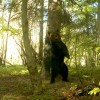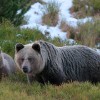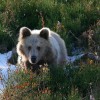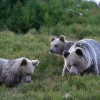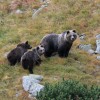Climate change is one of the main global threats to biodiversity. Understanding how species respond to climate change is pivotal for biodiversity conservation and ecosystem management. Boreal and alpine regions are likely to be especially affected by climate change, particularly in Europe.
Large carnivores inhabiting these regions may be good indicators of ongoing climate and environmental changes. Similarly to the polar bear Ursus maritimus in the Arctic, the brown bear Ursus arctos may be a model species in climate change research, particularly in boreal and alpine ecosystems. Recent observations suggest a shortening of the bear winter denning period and, thus, potential trophic mismatches. Climate-induced changes in denning, foraging patterns or potential range shifts into new areas may affect the occurrence of human-bear conflicts and how bears are perceived and valued.
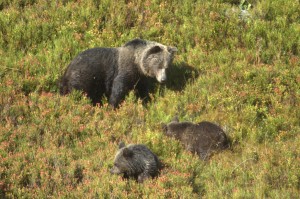
Our main goal is to assess the current and future effects of climate change on two brown bear populations (Scandinavian and Carpathian) and to disentangle the mechanisms for climate-change adaptation in large carnivores from northern ecosystems. We hypothesize that climate-related factors, in interaction with non-climate factors, particularly human-driven habitat changes, are strongly affecting brown bear wintering patterns, physiological state, foraging ecology and human-bear relations.
To address these research questions, we will combine different methods, such as GPS telemetry, stable isotope and hormonal analysis, climate envelope and predictive models, spatial analysis and socio-economic surveys. The analyses of long-term datasets (c.a. 30 years for the Scandinavian population) at the population and individual level provide a unique opportunity to advance in our understanding of climate change impacts on biodiversity and ecosystem functioning. This project may also have important implications for brown bear management and conservation.
Photo by Tomasz Zwijacz-Kozica













